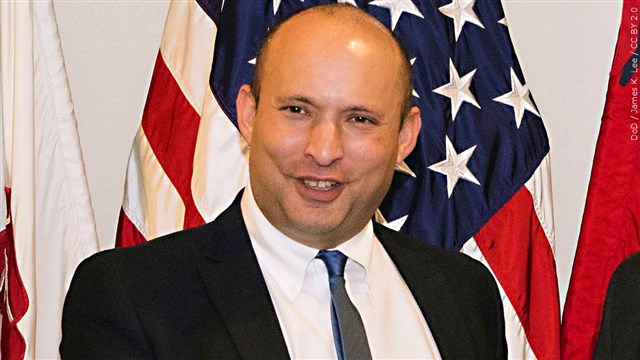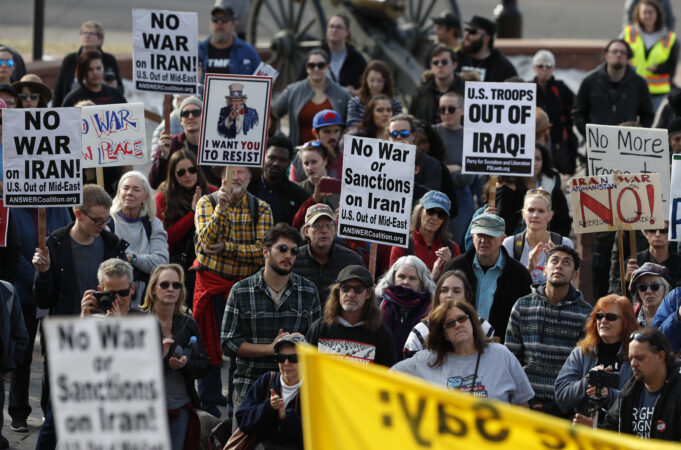The United States and the Zionist State of Israel are again stoking tension in the Middle East with specific war mongering toward the Islamic Republic of Iran. Incendiary rhetoric, assassinations, sabotage, crippling sanctions, and military confrontation have all accelerated U.S., Israel, and Iran on the path to war.
The record of antagonism is lengthy. With several military fights and near war incidences in the region, the Middle East appears to be warming up for a possible multi-nation conflict. There are questions will the drama and the escalating hostility toward Iran from its two main foes—America and Israel lead to war?
“Can it lead to war? Definitely,” said Sara Flounders, co-founder of the New York-based International Action Center. “It has since the creation of the state of Israel,” she added. Israel as a source of upset in the Middle East has served U.S. interests from its beginning over seven decades ago, explained Ms. Flounders.
The Middle East has been reeling in skirmishes. Iranian officials accused its geopolitical foes of “psychological warfare” and “setting the stage for new bouts of adventurism,” after they blamed Iran for an August 3 hijacking of a petroleum tanker in the Gulf of Oman and a drone attack of an Israeli-operated tanker days earlier on July 29.
In June, American troops fought Iraqi militia fighters in Syria. Saudi Arabia is still engaging in fire fights with Houthi rebel forces allegedly backed by Iran. Amid the continued onslaught on Palestinians, Israel is also trading cross-border missile fire with neighboring Lebanon.
The common factor in these fights is Israel and America. The U.S. is the main supplier of hardware for war as the top weapon peddler in the region, which is a factor analysts say, should be considered.
After excessive Israeli airstrikes in May that killed nearly 300 Palestinians, Washington approved a $735 million sale of precision-guided weapons to Israel.
According to the Stockholm International Peace Research Institute that tracks global arms sales, the Middle East is the major beneficiary of American armaments of war and accounts for nearly half (47 percent) of U.S. global arms sales. Saudi Arabia accounted for 24 percent of total U.S. arms exports and major arms deals were also made with the United Arab Emirates. In addition, America subsidizes Israel with nearly $4 billion annually.
In the book The Fall of America by the Most Honorable Elijah Muhammad, patriarch of the Nation of Islam, he said the results of the U.S./Israel relationship will be and has been bathed in blood. “America and England deposited their little brother, Israel, on foreign soil, Palestine, which is Arab land,” wrote Elijah Muhammad.
For supporting the injustice of depriving and exiling Arabs of their own land, it is “costing America the power and authority she once exercised in the East,” continued Mr. Muhammad. “She is on her way out of the near East. This means bloodshed and plenty of it,” he added. “We are in a troubled world … a world that is erupting.”
Ms. Flounders reasoned, America’s power is unravelling on the world stage and it is being forced out of the Middle East. Pointing out the U.S. was booted out of Afghanistan and Iraq and witnessed the defeat of Saudi Arabia it backed against Houthi rebels in Yemen—alleged proxies of Iran. Other observers rhetorically ask if America is coming out of the Middle East what about Israel? It cannot stand alone, analysts said.

“Israel is just deathly afraid of losing that exclusive relationship with the United States that gives it $3.8 billion every year,” added Madea Benjamin, of the pro-peace organization Code Pink.
“It wants conflicts to continue and present itself as the great ally of the United States against these adversaries like Iran,” she reasoned.
These recent moves and counter moves of Middle East escalation are concerning because by potential they can develop into a wider global war that is referred to in the Bible as Armageddon, destined to decimate America’s power.
“The Honorable Minister Louis Farrakhan consistently reminded us that we have entered into the throes of the war of Armageddon,” said Dr. Abdul Haleem Muhammad, student Southwest Regional Minister of the Nation of Islam.
“The recent tensions between Israel, the Sunni Arab nations, against Iran is only another episode in this final battle,” continued Student Min. Haleem Muhammad.
He explained, Minister Farrakhan has warned America not to be dragged into a war at the instigation of Israel, and a war with Iran will draw in China, Russia, and the European Union.
Israel has been forthright in efforts to keep a wedge between the U.S. and Iran in efforts to undermine America ever returning to a 2015 nuclear deal between world nations and Iran. The U.S. walked away from the Joint Comprehensive Plan of Action (JCPOA), agreement under former President Donald Trump.
The contentious negotiations that have been stalled since June are also central as a catalyst for potential war if unresolved. However, on the sidelines has been Israel that opposes any deal with Iran and vowed to poison the well of negotiations.
Observers note Israel has a record of sabotaging Iran’s efforts and has been implicated in assassinating Iranian nuclear scientists, and American Iranian relations are defined by mutual animosity.
“U.S. and Iran have not had diplomatic relations for 41 years,” said Jamal Abdi, president of the Washington-based National Iranian American Council (NIAC).
“We have had sanctions that whole time, an economic embargo since ‘87, extraterritorial oil sanctions since ‘95, and iterations of maximum pressure sanctions since 2012,” Mr. Abdi tweeted on July 28. He said the one time the countries did diplomacy, former President Trump tore up the result.
“It is a very dangerous and can easily escalate into a more dramatic military conflict,” said Ms. Benjamin.
She said, it’s easy to blame Mr. Trump for creating much of the conflict by pulling out the 2015 nuclear agreement. “But we also have to blame (President Joe) Biden for not immediately re-entering it,” she added.
In addition to the spiraling danger toward conflict, is the new leadership shift in Iran with the election of Ebrahim Raisi to the presidency, who is considered a political hardliner. He is on the U.S. list of sanctioned individuals for alleged human rights abuses. Iran watchers don’t expect negotiations to come easy under his leadership. However, at his August 5 swearing in ceremony, Mr. Raisi spoke of reconciliation and peace in the region.
Mr. Raisi said nuclear weapons are “haram” or prohibited echoing a religious decree of Supreme Leader Ayatollah Ali Khamenei that nuclear “weapons have no place in the defense strategy of the Islamic Republic,” adding, “Sanctions against Iran must be lifted and we will support any diplomatic plan that achieves this goal.”
He condemned foreign interference in the region and in Iranian internal affairs and called for resolving the regional crises through intra-regional dialogue. “The involvement of outsiders in the region does not solve the problem,” Mr. Raisi stated. “Their meddling is the problem itself,” he added.
“By the U.S. still being there as a foreign actor it just perpetuates conflict,” Ms. Benjamin explained.
She said a way out of the dilemma of threat is for America to rein in and stop unconditionally supporting Israel. America’s support enables Israel to be a trouble source that is inflaming the region and an obstacle for negotiations and ultimately peace.
“If America goes into war in the Middle East, she will not come out a world power,” cautioned Student Min. Abdul Haleem Muhammad.













